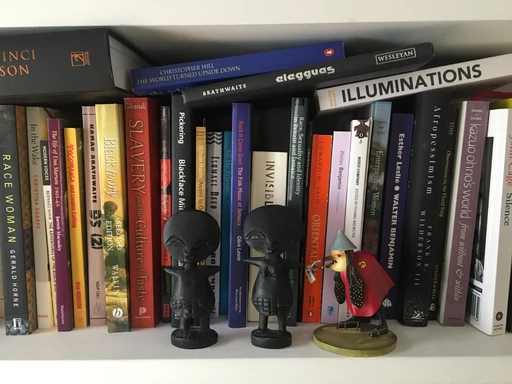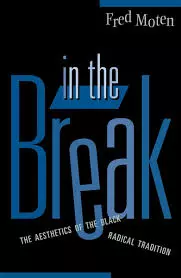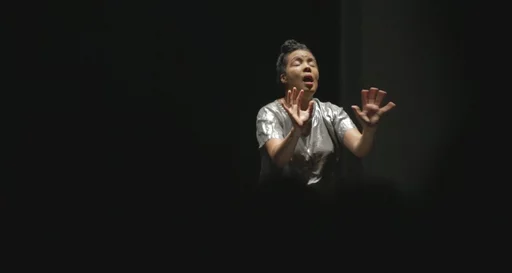
Unheard Voices: podcast with Elaine Mitchener
podcast by Elaine Mitchener – 09 nov. 2020topic: Diversity, Equity & Inclusion (DEI)
In this episode of Radio ArtEZ, vocalist, movement artist and composer Elaine Mitchener offers background to her work and her ideas. She will focus on the unheard voices of statues, rooms, places. Who do monuments represent and who do they speak for?
She will introduce some original voices in philosophy and music that deserve more attention and will guide us into ideas of philosophers Fred Moten and Walter Benjamin about resistance and memory. Central to her conversation will be Benjamin’s concept and practice of memory: Eingedenken, that takes remembrance as an act of responsibility. How do we choose to remember? History is written by the victors, said Benjamin, and the consequences resonate for ages.
www.elainemitchener.com

Elaine’s Playlist: for those interested in the Emancipatory Power of Music and Unheard Voices
One of the things I have learnt is that learning is lifelong and in order to understand, one needs to be patient. If we’re lucky, our knowledge and understanding will deepen as we mature. And some things we’ll never understand! So be patient with yourself.
Documentaries
The following documentary films on Claudia Jones and Angela Davis are connected to my podcast. Although from different generations they are connected by their political activism, social justice, communism, and feminism. These are followed by a documentary extract about the 1970s Mangrove Nine case following a Notting Hill protest against Police Harassment which culminated in the arrest of nine people including a young Darcus Howe and a headline case at the Old Bailey, and more recently Bristol BLM Protest (2020)
Documentaries
The following documentary films on Claudia Jones and Angela Davis are connected to my podcast. Although from different generations they are connected by their political activism, social justice, communism, and feminism. These are followed by a documentary extract about the 1970s Mangrove Nine case following a Notting Hill protest against Police Harassment which culminated in the arrest of nine people including a young Darcus Howe and a headline case at the Old Bailey, and more recently Bristol BLM Protest (2020)
Claudia Jones (1919 – 1964)
Angela Davis On Violence and Revolution (1967-75)
Mangrove Nine 1970's
Bristol Protest BLM March (2020)
Bristol Protest BLM March (2020)
My own work
I’ve included SWEET TOOTH (2017/18) which I made with Sylvia Hallett, Mark Sanders, Jason Yarde with movement direction by Dam Van Huynh because it explains why Bristol had to happen one day.
About: www.elainemitchener.com/sweet-tooth
I’ve included SWEET TOOTH (2017/18) which I made with Sylvia Hallett, Mark Sanders, Jason Yarde with movement direction by Dam Van Huynh because it explains why Bristol had to happen one day.
About: www.elainemitchener.com/sweet-tooth
My work the then + the now = now time (2019) is an exploration of Walter Benjamin’s notion of Eingedenken – a historical consciousness in which the past is not understood and glorified as something closed and complete. Benjamin seeks a form of remembering that emphasizes the past’s relentless presence. Against the mediating, conciliatory thrust of Erinnerung (memory), Eingedenken remains true to suffering in the past by refusing reconciliation with past wrongs. My artistic work is permeated by the awareness of past and present forms of discrimination, post-colonial wounds and its effect on humanity. the then + the now = now time is an artistic quest to politicize the past, undoing and unsettling time and space using music and movement.
With thanks to: Walter Benjamin, Sojourner Truth, Abel Meeropol, bell hooks, David Lammy, James Baldwin.
With thanks to: Walter Benjamin, Sojourner Truth, Abel Meeropol, bell hooks, David Lammy, James Baldwin.
TRAILER: the then + the now = now time (2019)
Mr David Lammy is the Labour MP for Tottenham in London, and has been an MP continuously since 22 June 2000. Below is his full speech to the UK Parliament on the Windrush Scandal (2018) which I incorporated into the piece. You can read the full transcript here: www.davidlammy.co.uk/single-post/2018/05/29/Speeches-on-the-Windrush-crisis-in-Parliament
A couple of films in response to the global pandemic:
The Holland Festival invited artists from the original 2020 festival programme to reflect on the festival theme: #inpursuitofthewe - in times of social distancing. The artists reflect on a quote from associate artist Bill T. Jones. In the form of intimate stories, poetry and dance, they share their ideas about the 'common we' ... How does the search for a 'common we' have an impact on their lives as people, individuals and artists? This is my response:
The Holland Festival invited artists from the original 2020 festival programme to reflect on the festival theme: #inpursuitofthewe - in times of social distancing. The artists reflect on a quote from associate artist Bill T. Jones. In the form of intimate stories, poetry and dance, they share their ideas about the 'common we' ... How does the search for a 'common we' have an impact on their lives as people, individuals and artists? This is my response:
Memory Says (Mitchener after Sun Ra, 2020)
Creative people find ways to process what’s happening around them and to support our wider communities. The wonderfully anarchic Colour Out of Space Festival created a ‘Plague Time Television show which ran for five sessions and invited artists to contribute.
MYSTERIE PLAY (Mitchener 2020)
Listen
My podcast included extracts from works which for me are excellent examples of ‘wordless’ / or vocally expressive explorations taking the listening through a sense of time and space from our present/to the past/ to the future. I am interested in the idea of conveying meaning without the use of vocabulary thereby I am able to tap into a 'language' of universal human experiences.
My podcast included extracts from works which for me are excellent examples of ‘wordless’ / or vocally expressive explorations taking the listening through a sense of time and space from our present/to the past/ to the future. I am interested in the idea of conveying meaning without the use of vocabulary thereby I am able to tap into a 'language' of universal human experiences.
Twinkie Clarke, Ye Shall Receive Power (1981)
Pamela Z, Bone Music (1992)
Katalin Ladik, O-pus (1972)
Abbey Lincoln (Driva Man) Max Roach 5tet with Abbey Lincoln (1964)
Fred Moten: is an American philosopher, poet and scholar whose work explores critical theory, black studies, and performance studies.
In the podcast, I read two fragments from his book In the Break: The Aesthetics of the Black Radical Tradition. The first quote are the opening sentences of the book, from the chapter called Resistance of the Object: Aunt Hester’s Scream. Moten refers to abolitionist Frederick Douglass (1818-1895), who became famous for his antislavery writings. The ‘terrible spectacle’ of the beating of his aunt Hester had introduced him to slavery, as he described in his Narrative of the Life of Frederick Douglass (1845). Starting from this scene, Moten critically analyses possible ways and meanings of narrating and representing such a horrible scene (or not), and arrives at the question: ‘Is there a way to subject this unavoidable model of subjection to a radical breakdown?’
‘The history of blackness is testament to the fact that objects can and do resist. Blackness—the extended movement of a specific upheaval, an ongoing irruption that anarranges every line—is a strain that pressures the assumption of the equivalence of personhood and subjectivity. While subjectivity is defined by the subject’s possession of itself and its objects, it is troubled by a dispossessive force objects exert such that the subject seems to be possessed—infused, deformed—by the object it possesses. I’m interested in what happens when we consider the phonic materiality of such propriative exertion.’
The second fragment I am reading in the podcast comes from the closing chapter of In the Break, where Moten explores resistance of the object through the work of conceptual artist and philosopher Adrian Piper (Resistance of the Object: Adrian Piper’s Theatricality)
‘What if the beholder glances, glances away, driven by aversion as much as desire? This is to ask not only, what if beholding were glancing; it is also—or maybe even rather—to ask, what if glancing is the aversion of the gaze, a physical act of repression, the active forgetting of an object whose resistance is now not the avoidance but the extortion of the gaze?’
In the podcast, I read two fragments from his book In the Break: The Aesthetics of the Black Radical Tradition. The first quote are the opening sentences of the book, from the chapter called Resistance of the Object: Aunt Hester’s Scream. Moten refers to abolitionist Frederick Douglass (1818-1895), who became famous for his antislavery writings. The ‘terrible spectacle’ of the beating of his aunt Hester had introduced him to slavery, as he described in his Narrative of the Life of Frederick Douglass (1845). Starting from this scene, Moten critically analyses possible ways and meanings of narrating and representing such a horrible scene (or not), and arrives at the question: ‘Is there a way to subject this unavoidable model of subjection to a radical breakdown?’
‘The history of blackness is testament to the fact that objects can and do resist. Blackness—the extended movement of a specific upheaval, an ongoing irruption that anarranges every line—is a strain that pressures the assumption of the equivalence of personhood and subjectivity. While subjectivity is defined by the subject’s possession of itself and its objects, it is troubled by a dispossessive force objects exert such that the subject seems to be possessed—infused, deformed—by the object it possesses. I’m interested in what happens when we consider the phonic materiality of such propriative exertion.’
The second fragment I am reading in the podcast comes from the closing chapter of In the Break, where Moten explores resistance of the object through the work of conceptual artist and philosopher Adrian Piper (Resistance of the Object: Adrian Piper’s Theatricality)
‘What if the beholder glances, glances away, driven by aversion as much as desire? This is to ask not only, what if beholding were glancing; it is also—or maybe even rather—to ask, what if glancing is the aversion of the gaze, a physical act of repression, the active forgetting of an object whose resistance is now not the avoidance but the extortion of the gaze?’

There are many more inspiring sources and I have included other examples of music which is by no means an exhaustive list, but it gives an indication of the many influences that continue to shape my practice.
Luciano Berio, O King (1967/68). 4:40
Archie Shepp, On This Night (If That Great Day Would Come) (1965, Impulse).
Lily Greenham, Lingual Music (2007, Paradigm Discs). 10:34
Jackson Mac Low with Jeanne Lee, The text on the opposite page (1965). 13:36
Folk Music of Jamaica (1956, Smithsonian Folkways). 43:36
Kim So-hee (김소희, 1917 – 1995)
Some Additional Material
Black Journal, Alice Coltrane segment (1970, Smithsonian). 15:40
This is from a 16mm documentary film shot three years after the death of jazz musician John Coltrane for the National Education Television's Black Journal television programme. The segment here focuses on the life of Alice Coltrane and her children in the wake of the death of her husband.
nmaahc.si.edu/object/nmaahc_2012.79.1.16.1a
Black Journal, Alice Coltrane segment (1970, Smithsonian). 15:40
This is from a 16mm documentary film shot three years after the death of jazz musician John Coltrane for the National Education Television's Black Journal television programme. The segment here focuses on the life of Alice Coltrane and her children in the wake of the death of her husband.
nmaahc.si.edu/object/nmaahc_2012.79.1.16.1a
Rising Tones Cross (1985, dir. Ebba Jahn) 1:52:00. Documentary on the avant-garde jazz scene in New York.
Born in Flames (1983, dir. Lizzie Borden). 1:20:00
This 1983 documentary-style feminist fiction film explores racism, classism, sexism, and heterosexism in an alternative United States socialist democracy.
www.undergroundfilmjournal.com/streaming-born-in-flames/
Read: lwlies.com/articles/born-in-flames-lizzie-borden-interview/
“We will inhabit a concept of remembering as an act of responsibility. An act that in turn is ultimately liberating and healing.” (Elaine Mitchener)
This 1983 documentary-style feminist fiction film explores racism, classism, sexism, and heterosexism in an alternative United States socialist democracy.
www.undergroundfilmjournal.com/streaming-born-in-flames/
Read: lwlies.com/articles/born-in-flames-lizzie-borden-interview/
“We will inhabit a concept of remembering as an act of responsibility. An act that in turn is ultimately liberating and healing.” (Elaine Mitchener)
related events
07 dec. 2020
Kitchen Table Conversation with Elaine Mitchener
related content
refered to from:
blog – 29 mei 2024
De keuze van Priscilla Macintosh
Favorieten uit het Studium Generale-archief rondom Keti Koti
video – 08 feb. 2021

